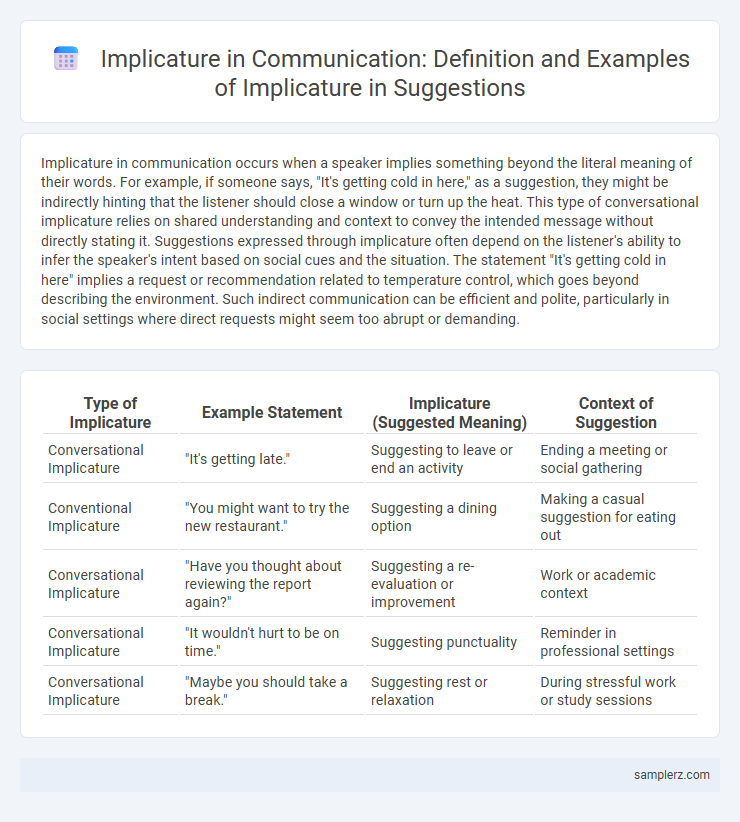Implicature in communication occurs when a speaker implies something beyond the literal meaning of their words. For example, if someone says, "It's getting cold in here," as a suggestion, they might be indirectly hinting that the listener should close a window or turn up the heat. This type of conversational implicature relies on shared understanding and context to convey the intended message without directly stating it. Suggestions expressed through implicature often depend on the listener's ability to infer the speaker's intent based on social cues and the situation. The statement "It's getting cold in here" implies a request or recommendation related to temperature control, which goes beyond describing the environment. Such indirect communication can be efficient and polite, particularly in social settings where direct requests might seem too abrupt or demanding.
Table of Comparison
| Type of Implicature | Example Statement | Implicature (Suggested Meaning) | Context of Suggestion |
|---|---|---|---|
| Conversational Implicature | "It's getting late." | Suggesting to leave or end an activity | Ending a meeting or social gathering |
| Conventional Implicature | "You might want to try the new restaurant." | Suggesting a dining option | Making a casual suggestion for eating out |
| Conversational Implicature | "Have you thought about reviewing the report again?" | Suggesting a re-evaluation or improvement | Work or academic context |
| Conversational Implicature | "It wouldn't hurt to be on time." | Suggesting punctuality | Reminder in professional settings |
| Conversational Implicature | "Maybe you should take a break." | Suggesting rest or relaxation | During stressful work or study sessions |
Understanding Implicature in Communication
Implicature in communication often appears in suggestions, where the speaker implies a recommendation without stating it directly, such as saying "It's getting late" to suggest ending a meeting. Understanding implicature requires recognizing the intended meaning behind the literal words, relying on shared context and conversational norms. This subtle form of indirect communication enhances social interactions by allowing speakers to convey messages politely or efficiently.
The Role of Implicature in Making Suggestions
Implicature plays a crucial role in making suggestions by allowing speakers to convey recommendations indirectly, thus maintaining politeness and minimizing imposition. For instance, the utterance "It's getting late" implies a suggestion to leave without explicitly stating it, relying on shared contextual knowledge. This indirectness enhances communicative efficiency and fosters cooperative interaction between interlocutors.
Common Implicature Patterns in Suggestions
Common implicature patterns in suggestions often involve indirect language, such as using modal verbs like "could" or "might" to imply a recommendation without stating it explicitly. For example, saying "You might want to check the report before submitting" suggests a course of action while maintaining politeness and avoiding direct commands. Such patterns rely on shared contextual understanding to convey suggestions subtly, enhancing cooperative communication.
How Implicature Shapes Polite Recommendations
Implicature in suggestions often relies on indirect language to convey politeness, such as using hints or softened commands like "You might want to consider taking a break." This form of communication allows speakers to offer recommendations without imposing, thereby maintaining social harmony and respect for the listener's autonomy. Polite recommendations shaped by implicature effectively balance clarity with courtesy, enhancing interpersonal interactions.
Cultural Differences in Suggestive Implicature
Suggestive implicature varies significantly across cultures, as indirect suggestions common in high-context cultures like Japan or China may be perceived as vague or unclear in low-context cultures such as the United States or Germany. For instance, a Japanese speaker hinting at dissatisfaction indirectly might rely on subtle cues that a Western listener could overlook, leading to miscommunication. Understanding these cultural differences is crucial in international communication to correctly interpret implied suggestions and avoid misunderstandings.
Implicature Versus Direct Suggestions
Implicature in suggestions often involves indirect hints or cues that rely on shared context and listener inference, such as saying "It's chilly in here" to suggest closing a window without explicitly stating it. Direct suggestions clearly articulate the desired action, like "Please close the window," reducing ambiguity and ensuring straightforward comprehension. Understanding the difference between implicature and direct suggestions enhances effective communication by balancing politeness and clarity.
Examples of Conversational Implicature in Advice
When advising a colleague about time management, saying "You might want to check your calendar" implies they should review their schedule without explicitly stating it. Suggesting "It could be helpful to ask for feedback" indirectly encourages seeking input to improve performance. These examples of conversational implicature in advice rely on shared understanding to convey recommendations subtly.
Implicature in Workplace Suggestions
Implicature in workplace suggestions often involves indirect language where the speaker implies a recommendation without stating it explicitly, such as saying, "Meeting deadlines has been challenging lately," to suggest improved time management. This pragmatic approach fosters a cooperative atmosphere by softening critiques and encouraging reflection without direct confrontation. Understanding these subtle cues enhances effective communication and collaboration in professional environments.
Recognizing Hidden Meanings in Suggestions
Recognizing hidden meanings in suggestions requires understanding implicature, where the speaker implies more than what is explicitly stated. For example, saying "It's getting cold in here" can implicitly suggest closing a window without directly requesting it. Interpreting such indirect communication enhances clarity and effectiveness in conversational exchanges.
Strategies for Interpreting Suggestive Implicature
Suggestive implicature in communication often requires interpreting indirect cues and context to grasp the intended message. Strategies for interpreting suggestive implicature include analyzing the speaker's tone, examining the conversational context, and considering shared knowledge between interlocutors. Effective interpretation relies on recognizing non-literal meanings and the purpose behind the suggestion within pragmatic frameworks.

example of implicature in suggestion Infographic
 samplerz.com
samplerz.com